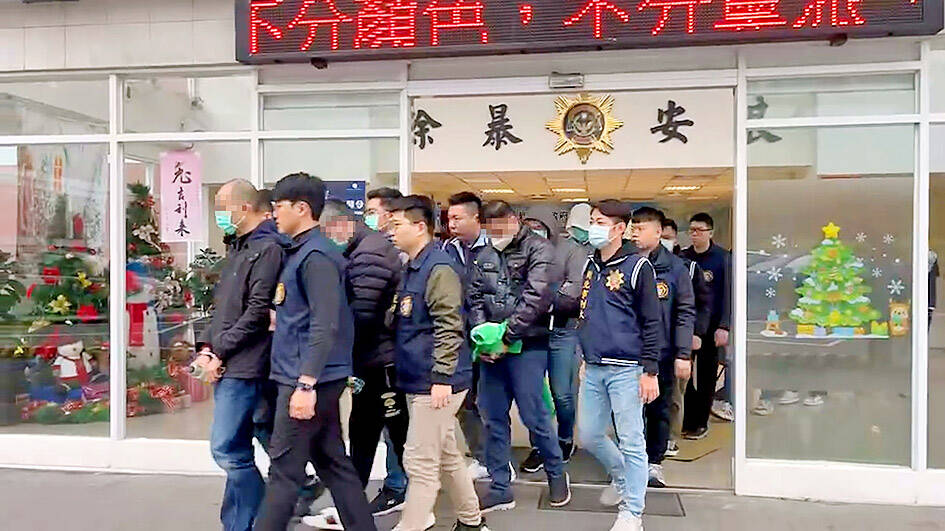A prominent lawyer and several other suspects have been detained over alleged fraud and money laundering in connection with unlawful profiteering schemes involving cryptocurrency trading platform ACE Exchange.
Prosecutors yesterday questioned attorney Wang Chen-huan (王晨桓), chairman of ACE Exchange and senior partner of Taipei legal firm Chien Yeh Law Offices, who was denied bail and placed in pretrial detention.
Taipei prosecutors estimated the case affected more than 600 people investing in NFTC tokens, bitnature coins and mochange, a token introduced by ACE Exchange.

Photo copied by Hsu Sheng-lun, Taipei Times
Launched by David Pan (潘奕彰) and his business partner, Lin Keng-hong (林耿宏), ACE Exchange has become among Taiwan’s leading cryptocurrency trading platforms registered under Taipei-based ACE Digital Innovations Co.
Pan and Lin ran ads for cryptocurrency investment schemes on social media starting in 2020, to gain the confidence of local investors.
In their promotional talks, the duo talked of building ACE Exchange into Asia’s most complete blockchain ecosystem for cryptocurrency trading, but Taipei prosecutors said that many investors saw the value of their tokens go into a tailspin.
The investors said they could not convert them back to New Taiwan dollars as promised and filed complaints to seek a judicial investigation, believing they had been duped.
Pan and Lin, along with five ACE Exchange employees were questioned and detained by prosecutors last month.
It is estimated the duo reaped illegal revenue of more than NT$1 billion (US$31.9 million) over the past three years, the Taipei District Prosecutors’ Office said.
In the second round of searches this week, Wang, ACE Exchange employee Kao Wei-lun (高偉倫), and Lin’s girlfriend, Lin Shu-fen (林淑芬), were detained on suspicion of assisting in operating the fraudulent scheme and also money laundering.
Investigators seized NT$47 million of cash at Wang’s home, as well as cash and cryptocurrency tokens valued at NT$180 million from the three suspects.
BLACKROCK SCAM
In a separate case, authorities in Taichung conducted raids and detained about 60 people in an investigation into a fraud ring operated by three men, surnamed Yu (余), Cheng (鄭) and Tsai (蔡).
Members of the fraud ring were questioned yesterday by the Criminal Investigation Bureau’s central Taiwan office.
Yu allegedly headed the operation as the main financial backer, and together with Cheng and Tsai made fraudulent claims about being representatives of BlackRock Inc, the US multinational investment company that is among the world’s largest asset managers, and convincing people to invest in various schemes.
Bureau officials said that since 2021, the ring had enticed 81 people to buy stocks and funds, making NT$182 million.
Yu, Cheng and Tsai are facing charges of fraud, money laundering and engaging in organized crime.
BANKING FRAUD
In another investigation by Taipei prosecutors, businessman Wang Meng-po (王孟博) was questioned in connection with banking fraud in which he allegedly made NT$490 million.
Prosecutors said evidence showed that Wang registered shell companies in the Virgin Islands and, with the assistance of a Vietnamese man, produced fraudulent letters of credit to deceive Taishin International Bank and a Vietnamese bank.
Detailed checks found more than 100 transnational trades and money transfers conducted by the shell companies since 2021 were fraudulent, they said.
They forged letters of credit, proforma invoices, bills for the non-existent transport of cargo shipments and other forms of faked receipts to deceive the banks, prosecutors said.
Additional reporting by Chang Jui-chen

Beijing could eventually see a full amphibious invasion of Taiwan as the only "prudent" way to bring about unification, the US Department of Defense said in a newly released annual report to Congress. The Pentagon's "Annual Report to Congress: Military and Security Developments Involving the People's Republic of China 2025," was in many ways similar to last year’s report but reorganized the analysis of the options China has to take over Taiwan. Generally, according to the report, Chinese leaders view the People's Liberation Army's (PLA) capabilities for a Taiwan campaign as improving, but they remain uncertain about its readiness to successfully seize

Taiwan is getting a day off on Christmas for the first time in 25 years. The change comes after opposition parties passed a law earlier this year to add or restore five public holidays, including Constitution Day, which falls on today, Dec. 25. The day marks the 1947 adoption of the constitution of the Republic of China, as the government in Taipei is formally known. Back then the Chinese Nationalist Party (KMT) governed China from Nanjing. When the KMT, now an opposition party in Taiwan, passed the legislation on holidays, it said that they would help “commemorate the history of national development.” That

Taiwan has overtaken South Korea this year in per capita income for the first time in 23 years, IMF data showed. Per capita income is a nation’s GDP divided by the total population, used to compare average wealth levels across countries. Taiwan also beat Japan this year on per capita income, after surpassing it for the first time last year, US magazine Newsweek reported yesterday. Across Asia, Taiwan ranked fourth for per capita income at US$37,827 this year due to sustained economic growth, the report said. In the top three spots were Singapore, Macau and Hong Kong, it said. South

Snow fell on Yushan (Jade Mountain, 玉山) yesterday morning as a continental cold air mass sent temperatures below freezing on Taiwan’s tallest peak, the Central Weather Administration (CWA) said. Snowflakes were seen on Yushan’s north peak from 6:28am to 6:38am, but they did not fully cover the ground and no accumulation was recorded, the CWA said. As of 7:42am, the lowest temperature recorded across Taiwan was minus-5.5°C at Yushan’s Fengkou observatory and minus-4.7°C at the Yushan observatory, CWA data showed. On Hehuanshan (合歡山) in Nantou County, a low of 1.3°C was recorded at 6:39pm, when ice pellets fell at Songsyue Lodge (松雪樓), a